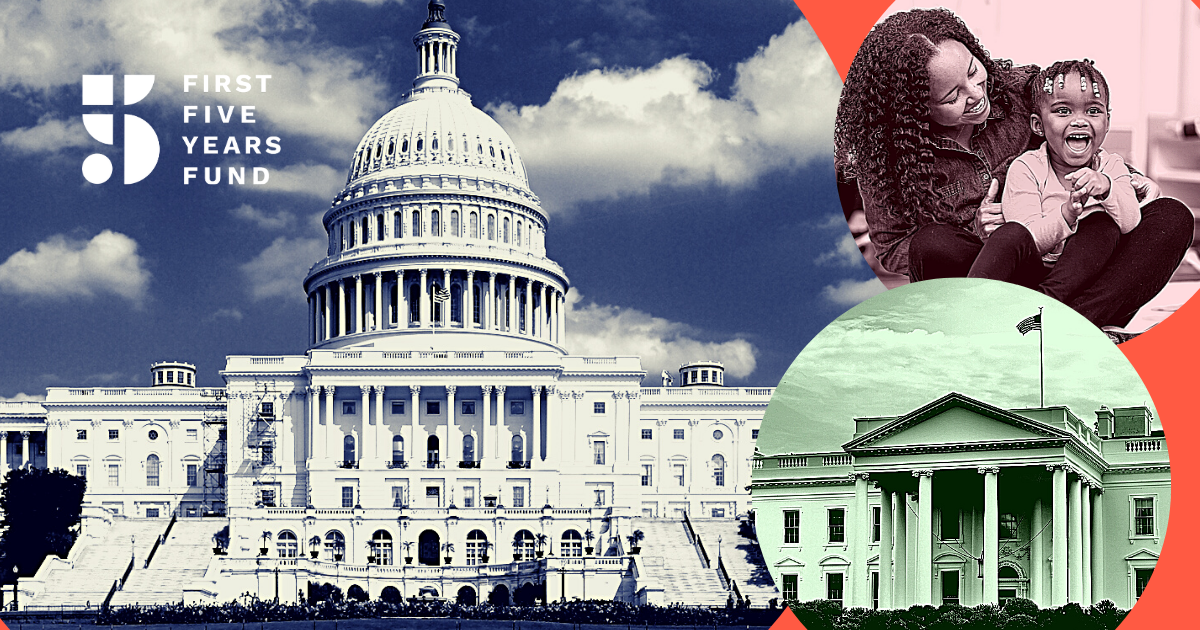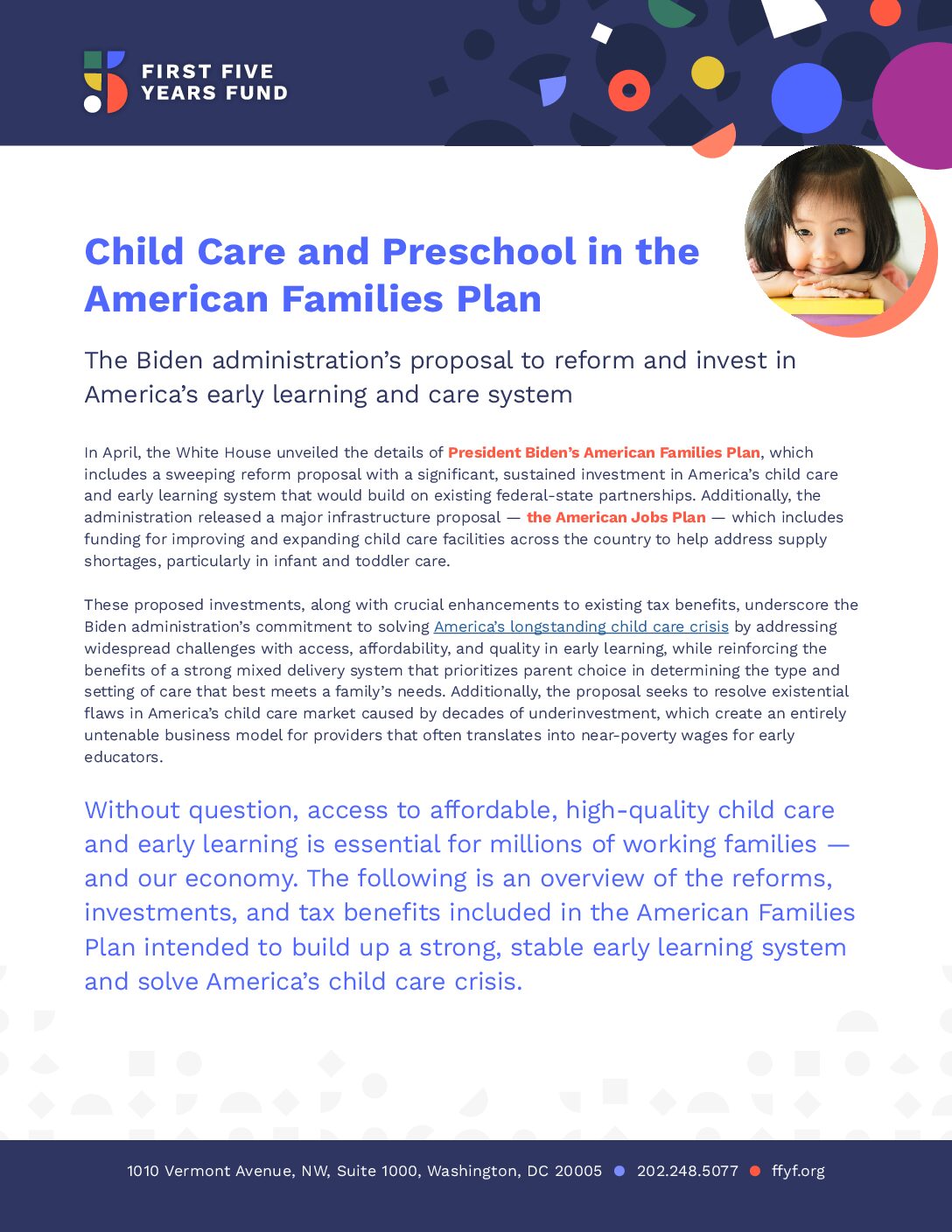Child Care and Preschool in the Build Back Better Act

The Biden administration’s proposal to reform and invest in America’s early learning and care system
In April, the White House unveiled the details of President Biden’s American Families Plan, which includes a sweeping reform proposal with a significant, sustained investment in America’s child care and early learning system that would build on existing federal-state partnerships. Additionally, the administration released a major infrastructure proposal — the American Jobs Plan — which includes funding for improving and expanding child care facilities across the country to help address supply shortages, particularly in infant and toddler care.
These proposed investments, along with crucial enhancements to existing tax benefits, underscore the Biden administration’s commitment to solving America’s longstanding child care crisis by addressing widespread challenges with access, affordability, and quality in early learning, while reinforcing the benefits of a strong mixed delivery system that prioritizes parent choice in determining the type and setting of care that best meets a family’s needs. Additionally, the proposal seeks to resolve existential flaws in America’s child care market caused by decades of underinvestment, which create an entirely untenable business model for providers that often translates into near-poverty wages for early educators.
Congress is now considering legislation built around the president’s American Families Plan – now known as the Build Back Better Act – which Democrats are working to pass through the budget reconciliation process.
Without question, access to affordable, high-quality child care and early learning is essential for millions of working families — and our economy. The following is an overview of the reforms, investments, and tax benefits included in the Build Back Better Act intended to build up a strong, stable early learning system and solve America’s child care crisis.
Build Back Better Act At a Glance
Key Early Learning & Care Provisions:
- $225 billion to address the child care needs of families and providers with investments in expanding access, affordability, and quality in child care for children from birth through age five
- $220 billion to guarantee free access to preschool for 3- and 4-year-olds
- Permanently extends recent improvements to the Child and Dependent Care Tax Credit (CDCTC), which was temporarily expanded through the American Rescue Plan Act
Additional Related Provisions:
- $225 billion to create a national comprehensive paid family and medical leave program
- Extends the Child Tax Credit increases in the American Rescue Plan Act through 2025 and makes the Child Tax Credit permanently fully refundable
I. $225 Billion to Address Access, Affordability, and Quality in Child Care
The Build Back Better Act includes $225 billion to ensure every family who needs it can find and afford high-quality child care options for children from birth through age 5. This funding would flow to states to expand the reach of their existing child care programs, which currently only reach a fraction of the eligible population of low-income children they are intended to serve. Families would be able to choose the type and setting of care that best meets their needs, from child care centers to family child care providers to Early Head Start programs. Specifically, this proposal would:
- Ensure working families earning 1.5 times their state median income would pay no more than 7% of their income on child care. This would save the average family $14,800 per year on child care expenses. What families pay would be based on a sliding scale, with child care costs fully covered for lower-income families.
- Eliminate barriers to high-quality care options by ensuring participating child care providers receive adequate funding to cover the true cost of quality early childhood care and education, including a developmentally appropriate curriculum, small class sizes, and culturally and linguistically responsive environments that are inclusive of children with disabilities.
- Guarantee a $15 minimum wage for early childhood staff and ensure that those with similar qualifications as kindergarten teachers receive comparable compensation and benefits.
- Advance and support the early education workforce by offering child care workers job-embedded coaching and professional development, along with additional training opportunities
II. $200 Billion to Guarantee Access to High-Quality Preschool for 3- and 4-Year-Olds
Underscoring the need to establish a well-funded continuum of care and education for children in early childhood, the Build Back Better Act includes $200 billion for a national partnership with states to ensure all 3- and 4-year-old children have free access to high-quality preschool. Under the proposal, funding would prioritize high-need areas and communities, and would rely on a mixed delivery system that allows families to choose the providers and settings that work best for them, including child care centers and family child care homes, Head Start programs, and schools. Specifically, this program would:
- Make preschool free for any 3- and 4-year-old child whose family chooses to enroll them, saving the average family $13,000, when fully implemented
- Guarantee all children are able to access high-quality options, regardless of income, by implementing important quality and safety standards related to student-to-teacher ratios, high-quality and developmentally appropriate curriculum, and supportive classroom environments that are inclusive for all children.
- Advance and support the child care workforce by guaranteeing that all employees in participating pre-K programs and Head Start will earn at least $15 per hour, and those with comparable qualifications will receive compensation commensurate with that of kindergarten teachers
IV. Strengthen the Child and Dependent Care Tax Credit (CDCTC)
While there are a handful of tax credits and deductions that support families with children, only the Child and Dependent Care Tax Credit (CDCTC) was designed to help working parents with the cost of work-related child care expenses. The Build Back Better Act would make permanent a recent expansion of the CDCTC, which was strengthened through the American Rescue Plan Act. Specifically, this proposal would:
- Increase the value of the credit so that families earning less than $125,000 per year are eligible to receive a tax credit for as much as half of their spending on qualified child care expenses for children under age 13, up to a total of $4,000 for one child or $8,000 for two or more children
- Offer a partial tax credit to families making between $125,000 and $400,000
- Make the CDCTC refundable to ensure this crucial benefit reaches families with a lower or no tax liability who rely on child care while they work or attend school
| RELATED RESOURCES: Our Child Care System is not Meeting the Needs of Families, Providers, or the Economy: Understanding the longstanding challenges related to access, affordability, and quality in America’s child care and early learning system, and why we need a significant, sustained investment from Congress. Understanding the Proven Benefits of High-Quality Early Learning & Care: Investing in child care and early learning is a solution that creates upward mobility by ensuring all children have the opportunity to build foundations for success in school and life, while allowing parents to work or attend school and pursue greater economic security. |
Subscribe to FFYF First Look
Every morning, FFYF reports on the latest child care & early learning news from across the country. Subscribe and take 5 minutes to know what's happening in early childhood education.




